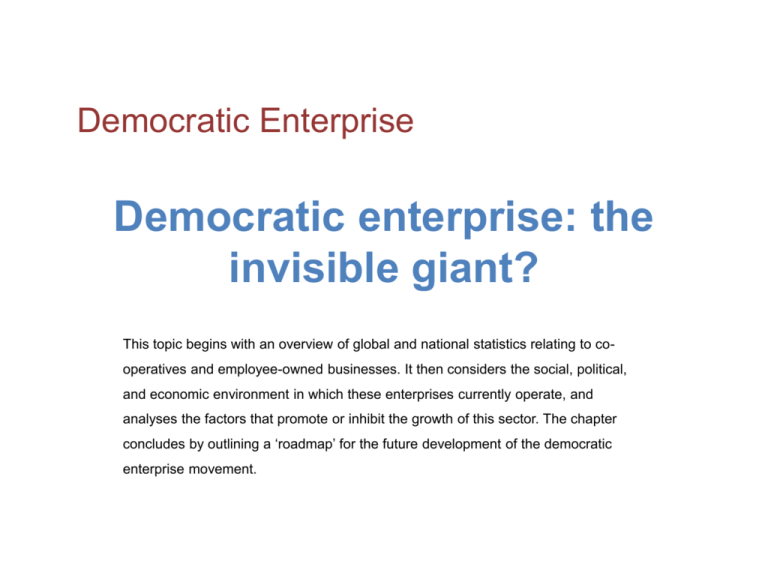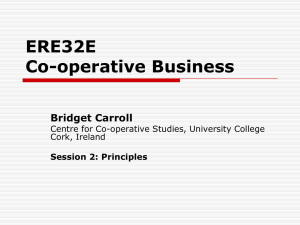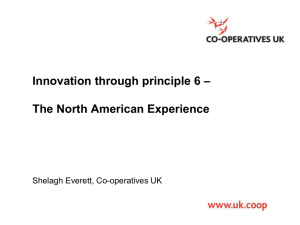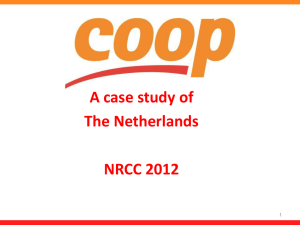Democratic enterprise the invisible giant-lecture - Co
advertisement

Democratic Enterprise Democratic enterprise: the invisible giant? This topic begins with an overview of global and national statistics relating to cooperatives and employee-owned businesses. It then considers the social, political, and economic environment in which these enterprises currently operate, and analyses the factors that promote or inhibit the growth of this sector. The chapter concludes by outlining a ‘roadmap’ for the future development of the democratic enterprise movement. Learning Goals • understand the prevalence of co-operatives and employeeownership on local, national, and international levels; • appraise the environment in which democratic enterprises currently operate; • analyse the factors that promote or inhibit growth of the democratic enterprise sector; • explain the steps needed to develop the sector at local, national, and international levels. Key Arguments • Co-operative and employee-owned businesses make a significant contribution to the world economy. • Globalisation presents both threats and opportunities for democratic enterprise. • There is increasing public appetite for democratic enterprise development which favours a ground-up rather than top-down approach. • Action and education are needed to ensure society benefits from a vibrant democratic enterprise sector in the future. Democratic enterprise today Examine figures for: • Co-operatives – Globally – UK • Employee-owned businesses Co-operatives globally (1) Source: ‘Statistical Information on the Co-operative Movement’ ICA. http://www.ica.coop/coop/statistics.html, accessed 29 September 2011. Co-operatives globally (2) The UK co-operative sector (1) No. of co-operative businesses in the UK: 5,450 No. of members: 12.8m Turnover of co-operatives: No. of people operatives: employed £32.2bn by co- 236,000 Source: Co-operatives UK. The UK co-operative economy 2011: Britain’s return to cooperation (Manchester: Co-operatives UK), 2011. The UK co-operative sector (2) Number of co-operatives by country 239 386 473 England Scotland Wales Northern Ireland 4352 Source: Co-operatives UK. The UK co-operative economy 2011: Britain’s return to co-operation (Manchester: Co-operatives UK), 2011. p. 23. The UK co-operative sector (3) % Growth of the UK co-operative movement 16 14 12 10 8 Growth % 6 4 2 0 -2 2008 2009 -4 2010 Year Turnover Membership Co-operatives Source: Co-operatives UK. The UK co-operative economy 2011: Britain’s return to co-operation (Manchester: Co-operatives UK), 2011. pp. 20-2. Worker co-operatives (1) UK – 450 worker co-operatives (around 40-50 in Scotland). Emilia Romagna (Italy) - over 8,000 worker co-operatives operating in industries as diverse as ceramics, construction, fashion, social care and cheese production. Formation of federations is key; the largest is Legacoop with one million members and turnover of almost $8bn (Hancock, 2005). Known for ‘social co-operatives’. Worker co-operatives (2) US – the worker co-operative sector in the US (known as ‘democratic workplaces’) is smaller, in part due to the proliferation of another form of employee ownership, the ESOP. It is estimated that there are over 300 worker cooperatives in the US, employing 3,500 people and generating over $400m in revenue. The majority of these businesses are SMEs and operate in the retail and service sectors. Employee ownership (1) UK – the employee-owned sector in the UK is worth £25bn in revenue, accounting for two per cent of GDP (EOA, 2010). Estimated to be over 100 employee-owned enterprises (as defined by the EOA – many publically traded companies have low levels of employee ownership e.g. Vodafone). Spain – Sociedades laborales is the Spanish term for an employee-owned company. Figures from the second quarter of 2010 highlight the scale and impact of employee-owned companies in Spain: 15,303 employee-owned companies; 87,651 workers; estimated turnover of 16 billion euros (in 2007). Employee ownership (2) US – The employee ownership sector in the US is significantly better monitored and analysed than its UK counterpart. NCEO data: Type of Plan Number of Plans (as of early 2010) Number of Participants (as of the Value of Plan Assets end of 2008) (as of the end of 2007) ESOPs, stock bonus 11,300 plans, & profit sharing plans primarily invested in employer stock 13.6 million $901 billion 401(k) plans primarily invested in company stock 5 million $200 billion Broad-based individual 3,000 equity plans 10 million ($5 billion to $10 billion in 2008, S&P 1500 only) Stock purchase plans 11 million (not realistic to estimate) 800 4,000 Issues facing Democratic Enterprises 1. Globalisation 2. Growing income inequality 3. Big Society (UK) 4. Public support Globalisation Opportunity or threat? Democratic enterprises can play a dual role in relation to globalisation (RidleyDuff and Bull, 2011): 1. They can accept globalisation and use it as a mechanism to achieve their social and economic objectives. The Mondragon co-operatives for example, have embraced globalisation and have factories throughout the world, some of which are in rapidly developing nations. 2. They can limit the (negative) effects of globalisation by placing emphasis back on local communities. Examples include the role of co-operatives in the Fairtrade movement, micro finance and worker take-overs. Growing income inequality Big Society Initiative developed by the coalition government in the UK aims to help people ‘to come together to improve their own lives. It’s about putting more power in people’s hands – a massive transfer of power from Whitehall to local communities.’ 1. Giving communities more power – over the planning process; right to bid to takeover public services as well as rescue local facilities or services that are threatened with closure. 2. Encourage volunteering. 3. Transfer power from central government to local government. 4. Support for mutuals, charities, co-operatives and social enterprises. 5. Publish government data (Cabinet Office, 2010). Public support (1) There is a general consensus amongst large sections of the public that radical changes are needed in business and politics (in the UK and further afield). There are expectations that business should do more to invest in society. According to one survey, co-operatives are regarded as more trustworthy than the traditional PLC. Public Support (2) Source: 2011 Edelman Trust Barometer: Findings. Edelman, 2011. Public Support (3) Source: 2011 Edelman Trust Barometer: Findings. Edelman, 2011. Public Support (4) Source: G. Simon and E. Mayo, Good business? Public perceptions of co-operatives (Manchester: Co-operatives UK, 2010), p. 6. Factors affecting Democratic Enterprises Some of the barriers to the development of the employee ownership sector in the UK (Knell, 2008): 1. Shortage of data on the extent of the sector and its performance; 2. Lack of awareness and information about the sector among business owners, advisers, financial institutions, and public sector policy makers; 3. Unnecessarily restrictive tax rules affecting the sector; 4. A relative lack of appropriate finance; 5. Inadequate Government appreciation of and support for the sector; 6. Inadequate recognition in public purchasing procedures of potential value for money advantages offered by co-owned sector providers. Social factors Social capital: democratic enterprises are reliant on an intangible resource known as social capital in order to support their development and legitimise their purpose. Social capital is term that ‘describes the pattern and intensity of networks among people and the shared values which arise from those networks’. There are different layers of social capital, known as bonding, bridging and linking. Education: there is interest in learning about co-operatives at primary and secondary level, as evidenced by the growth in the number of co-operative trust schools in England. In higher education, however, opportunities to learn about democratic models of enterprise are limited. The majority of economic research focuses on the investor-owned firm and the majority of teaching in business schools concerns the investor-owned firm. It is important that students of all ages, who will form the next generation of entrepreneurs, are afforded the opportunity to learn about alternative Economic factors Financial resources: reports, studies, and anecdotal evidence point to the lack of financial resources, particularly start-up capital, available to employee-owned firms. This constraint affects the formation of employee-owned firms more so than it does investor-owned enterprises. Density: an economic ecosystem is characterised by the presence and density of certain types of organisation. Low density of democratic enterprises in an economy will tend to inhibit the rate of new formation. Support structures: an appropriate support framework is central to the development of the few successful, large-scale employee-owned sectors in the world (Mondragón in Spain, Emilia-Romagna in Italy). Elements include tailored financial provision, facilitating legislation, and development agencies with appropriate resources. Political factors Knowledge and information: although all three major political parties in the UK declared support for co-operative and mutual models of enterprise in the national election of 2010, there is a need to improve the knowledge and information about these models among policy makers. Research: the UK needs institutional structures to promote research about co-operatives and employee-ownership, similar to those found in Europe and the US. Supportive legislation and taxation: in the UK, companies are enticed to distribute shares amongst employees through attractive tax breaks and facilitative legislation (most notably Share Incentive Plans). Levels of employee ownership in the US would not be where they are today without the support of the tax efficient ESOP legislation. Finally, worker co-operatives in Spain, Italy and France have flourished as a result of legislation that facilitates their development. Where to now? A Co-operatives UK report released in 2010 sought to provide a ‘roadmap’ for how the UK movement could develop and grow in the next decade. The report outlines three key steps (Murray, 2010): 1. UK co-operatives need to act more like a movement, particularly in response to the present socio-economic climate. 2. The movement should shift its focus from co-operative ‘form’ to co-operative ‘values’, again to reflect the pressing concerns in the UK such as environmental damage and social corrosion. 3. There needs to be a new model for financing co-operative creation and growth. Possibilities Energy supply and renewable energy generation are becoming areas of growth for consumer co-operatives, as evidenced by the number of recent startups. Business succession offers good potential for the creation of employee-owned businesses. The financial crisis has created opportunities for more credit unions, cooperative banks and mutual financial providers. Transfer of public services to co-operatives, social enterprises or employeeowned enterprises e.g. health trusts, social care services. Community enterprises such as local pubs, land, childcare services. Reflection The current Industrial Revolution In light of the increasing industrialisation of developing countries (China, India, Brazil, and Indonesia for example), do you think there are opportunities for the democratic model of enterprise to help alleviate the problems industrialisation inevitably brings? What would be the impact of increased numbers of democratic enterprises in rapidly developing industrialised countries? Summary • Co-operatives and employee-owned businesses play a significant role in societies and economies around the world. • The democratic enterprise sector in the UK is under-developed compared with the situation in some other countries and will remain so until more favourable regulatory frameworks and policies are in place. • There are social, economic, and political issues that must be addressed for the movement to develop and grow. • Renewable energy and financial services are among the most promising growth areas for democratic enterprise. Resources and Support Big Society Network http://thebigsociety.co.uk/. Beyond Grey Pinstripes http://www.beyondgreypinstripes.org/. People and Planet http://peopleandplanet.org/. Co-operative Global News Hub http://www.thenews.coop/. Co-operatives UK 2012 http://www.uk.coop/2012/. References and Reading (1) Birchall, J. People-centred Businesses: Co-operatives, Mutuals and the Idea of Membership. London: Palgrave MacMillan, 2010. Co-operatives UK. The UK Co-operative Economy 2011: Britain’s Return to Co-operation. Manchester: Co-operatives UK, 2011. Employee Ownership Association (EOA). ‘About Employee Ownership’, http://www.employeeownership.co.uk/employee-ownership/about-employeeownership/. Hancock, M. The Cooperative District of Imola: Forging the High Road to Globalization. Progress Report, Research Project on the Cooperative District of Imola, Prepared for MUEC, 2004–5. Hill, R. ‘The Case of the Missing Organizations: Co-Operatives and the Textbooks’ The Journal of Economic Education 31 (2000): 281–95. References and Reading (2) International Co-operative Alliance (ICA). ‘Statistical Information on the Cooperative Movement’, http://www.ica.coop/coop/statistics.html. Knell, J. Share Value: How employee ownership is changing the face of business. Herts: The All Party Parliamentary Group on Employee Ownership, 2008. Murray, R. Co-operation in the Age of Google. Manchester: Co-operatives UK, 2010. National Center for Employee Ownership (NCEO). ‘A Statistical Profile of Employee Ownership’ updated April 2011, http://www.nceo.org/main/article.php/id/2/. Wilkinson, R. and K. Pickett. The Spirit Level: Why Equality is Better for







